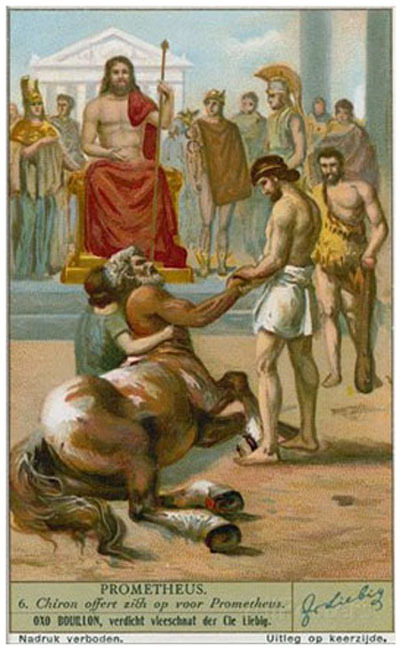
If you are open to sceptical questions about Christianity and are not very familiar with ancient Greek literature and mythology you may find the few notes below of interest.
When I first read the following passages (quite some time ago now) I was struck by the way motifs that later became central to Christianity are woven throughout the mythical tales.
After Prometheus had saved mankind from Zeus’s plan to destroy him, Zeus bound him to a rock and ordained an eagle to eat from his liver every day, with the wound healing overnight ready for a fresh dinner the next day — forever.
But a son of Zeus, Heracles, was eventually destined to release Prometheus from his torment.
The poet Hesiod from the 8th or 7th century BCE wrote:
And ready-witted Prometheus he bound with inextricable bonds, cruel chains, and drove a shaft through his middle, and set on him a long-winged eagle, which used to eat his immortal liver; but by night the liver grew as much again everyway as the long-winged bird devoured in the whole day.
That bird Heracles, the valiant son of shapely-ankled Alcmene, slew; and delivered the son of Iapetus from the cruel plague, and released him from his affliction — not without the will of Olympian Zeus who reigns on high, that the glory of Heracles the Theban-born might be yet greater than it was before over the plenteous earth. . . .
The fifth century BCE playwright Aeschylus explained in more detail why Prometheus had to suffer:
PROMETHEUS:
However, you ask why he torments me, and this I will now make clear. As soon as he had seated himself upon his father’s throne, he immediately assigned to the deities their several privileges and apportioned to them their proper powers. But of wretched mortals he took no notice, desiring to bring the whole race to an end and create a new one in its place.
Against this purpose none dared make stand except me—I only had the courage; I saved mortals so that they did not descend, blasted utterly, to the house of Hades. This is why I am bent by such grievous tortures, painful to suffer, piteous to behold. I who gave mortals first place in my pity, I am deemed unworthy to win this pity for myself, but am in this way mercilessly disciplined, a spectacle that shames the glory of Zeus.
But Prometheus knew a secret. He knew that Zeus himself was destined one day to be overthrown from his position as chief of the gods. (That particular hero, we elsewhere learn, was destined to be the semi-divine Achilles. But that’s another story.) The mortal Io (who was later to become the mother of the line that produced Heracles) is talking with Prometheus in his misery: Continue reading “Myths of Salvation Among Greek Gods and Heroes”
